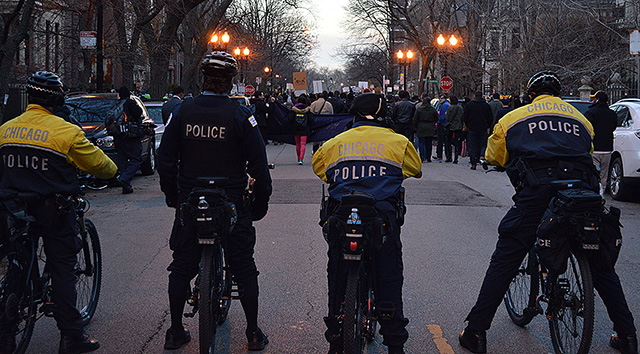Why Chicago's Police Force Can't Go On Strike
By Mae Rice in News on May 3, 2016 6:46PM

By Aaron Cynic/Chicagoist
If Chicago police were to ever go on strike, now would seem to be the time. Ever since the footage of Officer Jason Van Dyke fatally shooting Laquan McDonald was released two days before Thanksgiving, the city and the entire country has been critical—perhaps unprecedentedly critical—of the Chicago Police Department. Van Dyke was charged with first-degree murder before the video was made public; once it came out, there were protests against police brutality all winter, on the Magnificent Mile and elsewhere. Police were tasked with using their dashcams more rigorously, wearing body cameras, improving their response to mental health crises. Mayor Rahm Emanuel commissioned a Police Accountability Task Force, which issued a report in April arguing that systemic racism and a culture of silence plagues the CPD—and advocating for an overhaul in the city’s contract with police officers.
With the widespread criticism and change came reports of low morale among police officers. FiveThirtyEight argued that, based on data about police activity, police had slowed down work since the McDonald footage was released.
It all begs the question:
Could Chicago police go on strike?
No, they can't, the president of Chicago's police union, Dean C. Angelo Sr., told Chicagoist. To do so would be a violation of public safety laws and of the police contract. “Police officers know this going in [to the job],” he said.
Have police ever gone on strike anyway?
Not in Chicago, but elsewhere in the United States, yes. In Baltimore in 1974, 1,300 cops illegally joined a municipal strike over low wages, according to Tribune. (The Baltimore Sun put the number of striking officers lower, at 887.) There was also a police strike in Boston in 1919, when 1,100 of the city's 1,500 police officers went on strike after a vote to unionize, according to WGBH News. Calvin Coolidge, then the Massachusetts Governor, refused to negotiate with the strikers, though. “There is no right to strike against the public safety by anyone, anywhere, anytime,” he said. The sentiment prevails, legally speaking, to this day.
The Chicago Teacher’s Union recently went on a one-day strike that was arguably illegal, but that seemed… chill. What happens when cops strike?
Historically, the response to police strikes has not been chill. In 1974 Baltimore, more than 100 state troopers were called in to patrol the city; three union leaders were threatened with jail time; and in the aftermath of the strike, 457 officers were suspended from their posts, according to Tribune. In 1919, things were a bit grittier: the State Guard came in with “bayonets,” according to WGBH News, and the striking officers weren’t suspended, but fired outright.
What if, when the current police contract with the city expires in the summer of 2017, negotiations over the next contract break down?
Basically, that’s not possible. “The negotiation process is part of labor law,” D’Angelo Sr. explained—and it’s designed in such a way that it can’t break down. Both the city and the police union agree to adhere to the decisions of an array of "core committees," informed by recommendations from assorted subcommittees.Even if the two parties reach an impasse, there’s a procedure for that: “You file for an impasse.” From there, the city and FOP could opt for “mediation, or a binding arbitration.”
So no reason to worry about a strike?
Not to our knowledge. But the slowdown FiveThirtyEight outlined has been deadly on its own, fostering a spike in gun violence that has put Chicago crime rates at 1999 levels. Chicago's 1,000th 2016 shooting victim was shot in April, and in 2015 we didn't hit this grisly landmark until June. CPD may not be able to strike, but an unhappy police force is still a serious problem.
[